|
|
|
Sort Order |
|
|
|
Items / Page
|
|
|
|
|
|
|
| Srl | Item |
| 1 |
ID:
188953
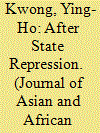

|
|
|
|
|
| Summary/Abstract |
The Chinese government has imposed the National Security Law which has resulted in Hong Kong formally entering into a phase of movement abeyance. By analysing 3377 posts on LIHKG Internet forum, this article re-explores the online protest attitude during this movement abeyance. The findings indicate that content creators are more attentive in regard to criticizing the legislation and pro-Beijing figures, followed by seeking international support and calling for unity. Users are more ‘participative’ in calling for mutual destruction between the authorities and people, initiating mutual support and seeking emigration. This study provides new perspectives on the study of movement abeyance.
|
|
|
|
|
|
|
|
|
|
|
|
|
|
|
|
| 2 |
ID:
194803


|
|
|
|
|
| Summary/Abstract |
What explains the emergence of al-Qaeda and the Islamic State as parties in civil wars? This study provides the first large-N analysis of this question, studying a sample of states in Africa, the Middle East and Asia, 2003–2020, contributing to ongoing debates among peace and conflict scholars about jihadist rebels in civil war. Theoretically, it is argued that higher levels of state repression and states’ military capabilities should impact the preferences of local groups and increase the likelihood of a ‘transnationalization’. On the other hand, it is hypothesized that increases in bureaucratic state capacity should reduce the risk of such transnationalization. A series of penalized logistic regressions yield support for the hypotheses regarding state repression and bureaucratic capacity, but not military state capacity. The findings point towards the importance of bureaucratic capacity building as well as the potentially adverse consequences of excessively repressive counterterrorism strategies.
|
|
|
|
|
|
|
|
|
|
|
|
|
|
|
|
| 3 |
ID:
156539
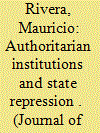

|
|
|
|
|
| Summary/Abstract |
Existing research has paid increasing attention to the role of political institutions such as legislatures and opposition parties in autocracies. So far, however, the relationship between nondemocratic institutions and state repression has remained largely unclear. This article argues that authoritarian institutions are related to divergent conflicting dynamics between incumbent regimes and opposition actors, which provide leaders with opposite incentives to repress. While authoritarian legislatures enhance leaders’ capacity to prevent conflict and reduce their need for repression, the presence of opposition parties helps opposition actors to overcome collective action barriers and mobilize against the incumbent regime, increasing the states’ need for repression. A panel data analysis of nondemocracies from 1976 to 2007 shows that authoritarian-elected legislatures reduce repression and the presence of opposition parties increases it. Moreover, the results indicate that autocracies with opposition parties and an elected legislature experience lower repression than autocracies with opposition parties but no elected legislature.
|
|
|
|
|
|
|
|
|
|
|
|
|
|
|
|
| 4 |
ID:
113953
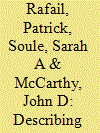

|
|
|
|
|
| Publication |
2012.
|
| Summary/Abstract |
Numerous scholars have observed a decline in more coercive police tactics used to control demonstrations since the 1960s in North America and Western Europe. Such claims, however, are largely based on rather unsystematic observation, and almost no research directly examines the evolution of protest policing during this entire period. To address this gap, the authors use semiparametric logistic regression to examine reported police presence, the use of arrests, and the use of force at 15,965 US protests occurring between 1960 and 1995. The results confirm that while there has been an absolute decline in more repressive policing behavior, the transitional process was not a monotonic, linear process. The authors also investigate the different evolutionary patterns of each type of protest policing. The authors further demonstrate that African American initiated events, government targets, social movement organization presence, protest forms, the use of force, and arrests have variable impacts on police responses over time.
|
|
|
|
|
|
|
|
|
|
|
|
|
|
|
|
| 5 |
ID:
128959
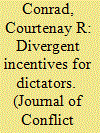

|
|
|
|
|
| Publication |
2014.
|
| Summary/Abstract |
Although they are arguably the worst violators of human rights, dictators sometimes commit to international human rights treaties like the United Nations Convention Against Torture (CAT) to appease their domestic opposition. Importantly, however, executives facing effective judiciaries must anticipate ex post costs that can arise when international treaties are likely to be enforced domestically. This suggests that one domestic institution-a political opposition party-may provide a dictator with incentives to commit to international human rights treaties and violate human rights, while another-an effective domestic judiciary-may constrain the dictator's ability to violate human rights and incentivize him to avoid international commitment. How do dictators make choices about commitment to human rights law and respect for human rights when they face conflicting domestic incentives? Furthermore, how do these divergent incentives affect compliance when dictators do commit to international treaties? In this article, I argue that the domestic incentives dictators face to support the CAT and engage in torture are moderated in countries with effective domestic judiciaries.
|
|
|
|
|
|
|
|
|
|
|
|
|
|
|
|
| 6 |
ID:
148121
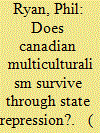

|
|
|
|
|
| Summary/Abstract |
Emma Ambrose and Cas Mudde argued in this journal that the absence of far-right parties in Canada can be attributed, among other factors, to “strong state repression of dissent” on multiculturalism policy. This article provides numerous examples of such dissent, to show that the state repression invoked by Ambrose and Mudde does not exist. The article also argues that certain “supply-side” explanations for the absence of a strong far-right apply to the Canadian case. It notes, in particular, how Steven Harper's Conservative government occupied much of the political space that might otherwise have been available for far-right challengers.
|
|
|
|
|
|
|
|
|
|
|
|
|
|
|
|
| 7 |
ID:
172338
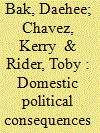

|
|
|
|
|
| Summary/Abstract |
Given the conventional claim that external threats increase internal cohesion and government capacity, cross-country studies have examined how interstate conflict events influence domestic politics. This article reevaluates the in-group and out-group mechanisms by examining how international strategic rivalry, which indicates the presence of persistent external threats even in the absence of military conflict, affects domestic political competition. An alternative explanation suggests that the effect of external threats on political incentives of domestic actors differs between regime supporters and oppositions. We posit that the presence of international threats from rival states inflames domestic unrest and oppositions’ antiregime challenges, while making governments rely more on repressive tactics given resource constraints and a high level of domestic political intolerance. In addition, we propose that the domestic consequences of international rivalry are heterogeneous depending on the characteristics of political systems and the level of threat perception. Empirical tests reveal robust evidence for the hypotheses.
|
|
|
|
|
|
|
|
|
|
|
|
|
|
|
|
| 8 |
ID:
178681
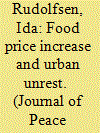

|
|
|
|
|
| Summary/Abstract |
Under what conditions do increasing food prices lead to urban unrest? Existing literature suggests a positive correlation between food prices and social unrest. Meanwhile, there is a large variation in the consequences of increasing food prices, indicating that this phenomenon has a heterogeneous effect across different contexts. The theoretical focus on grievances in the existing literature appears to be insufficient for explaining the variations in outcome. This study asks whether specific features in the domestic institutional setting can explain why food-price induced grievances sometimes lead to unrest and at other times do not. Specifically, the article argues that the manifestation of unrest when food prices increase is moderated by the degree to which the state represses societal organizations. Civil and political society have the potential to channel collective dissent around food-related grievances, as these organizations provide existing mobilization structures that people can draw on to engage in collective action. Further, they can translate an individual-level grievance into a group phenomenon by politicizing the cost of food through the formulation of grievance frames. If the state represses existing societal organizations that can help aggrieved individuals engage in collective action to voice discontent – or introduces barriers to initial mobilization – this will likely reduce the possibility of unrest when food prices go up. Using institutional data from the Varieties of Democracy (V-Dem) project combined with the Social Conflict Analysis Database (SCAD), the findings suggest that repression of societal organizations decreases the likelihood of unrest when food prices rise.
|
|
|
|
|
|
|
|
|
|
|
|
|
|
|
|
| 9 |
ID:
161654
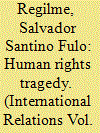

|
|
|
|
|
| Summary/Abstract |
How and to what extent do ideas and political discourses shape bilateral cooperation between a powerful state and its weaker ally? Why do weaker states act in ways that diverge from the expectations and preferences of the powerful state despite the contractual agreement borne out of bilateral cooperation? Drawing perspectives from constructivism and principal–agent framework, this article provides a conceptual-interpretative analysis of post-9/11 counterterror cooperation of the US government with Colombia – America’s long-standing ally in the region. The case study shows that the provision of security is not only conceived in the domestic levels but also produced in the transnational sphere; that security provision is not only a materially oriented political activity but also an ideational-discursive exchange where political actors legitimize and facilitate interstate cooperation; and, finally, that the power of dominant states is not only produced from within them but strategically reconstituted by weaker powerful states.
|
|
|
|
|
|
|
|
|
|
|
|
|
|
|
|
| 10 |
ID:
158212
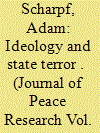

|
|
|
|
|
| Summary/Abstract |
How does ideology influence state terror? Studies on state repression have looked at the leaders’ decisionmaking to explain how much violence states use against internal enemies. However, government leaders usually rely on their security forces to produce violence. I argue that distinct ideological beliefs within the military apparatus produce different levels of repression even if leaders are determined to terrorize the population. I expect officers who share the ideology of their leader to willingly execute the government’s repressive program, while officers who do not share the leader’s convictions refuse to terrorize civilians. I study these dynamics in the case of Argentina’s Dirty War (1975–81) during which the government tasked its ideologically divided army with a nationwide terror campaign. Combining qualitative and quantitative data from historical sources, I identify the ideological beliefs and repressive behavior of military commanders. Consistent with my expectation, I find that loyal nationalist officers in the infantry, artillery, and communications branch of the army perpetrated significantly more violence than liberal cavalry officers who rejected the junta’s terror program. The results demonstrate that ideological beliefs within the state’s security apparatus can lead to violent outcomes that deviate from government orders.
|
|
|
|
|
|
|
|
|
|
|
|
|
|
|
|
| 11 |
ID:
168535
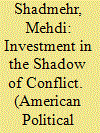

|
|
|
|
|
| Summary/Abstract |
In conflict-prone societies, the fear of expropriation that accompanies a regime change reduces capital investment. These reductions in investments, in turn, harm the economy, amplifying the likelihood of regime change. This article studies the implications of these feedback channels on the interactions between globalization, capital control, state repression, and regime change. I show that processes that facilitate capital movements (e.g., globalization, economic modernization, and technologies that reduce transportation costs) amplify the likelihood of regime change in conflict-prone societies and strengthen the elite’s demand for a strong coercive state. In particular, to limit their collective action problem and manage the political risk of regime change, capitalists support a state that imposes capital control. We identify two conflicting forces, the Boix Effect and the Marx Effect, which determine when capital control and state repression become complements (Nazi Germany) or substitutes (Latin American military regimes) in right-wing regimes.
|
|
|
|
|
|
|
|
|
|
|
|
|
|
|
|
| 12 |
ID:
182590
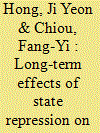

|
|
|
|
|
| Summary/Abstract |
This article examines how violence against citizens affects their political attitudes and behavior in the long run, and how those effects vary over time. We construct and analyze a novel dataset on the victims of Taiwan's February 28 Incident, in 1947, with survey data spanning 1990 to 2017. Our empirical analysis shows that cohorts having directly or indirectly experienced the Incident are less likely to support the Kuomintang Party (KMT), the former authoritarian ruling party responsible for the Incident. They tend to disagree with the key conventional policy stand of the KMT (unification with mainland China), are more likely to self-identify as Taiwanese, and are less likely to vote for KMT presidential candidates. Taiwan's residents who were born in towns with larger number of casualties during the Incident are more likely to reject unification. Finally, the effects are found to vary over the period following democratization.
|
|
|
|
|
|
|
|
|
|
|
|
|
|
|
|
| 13 |
ID:
175559
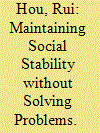

|
|
|
|
|
| Summary/Abstract |
What role do emotions play in state repression? Building upon ethnographic observation in one Beijing petition bureau, this paper explores the emotional labour performed by grassroots officials to demobilize social dissent. The petition system serves as an official channel through which the Chinese government receives complaints and grievances from citizens. Notwithstanding its institutional inefficiency in addressing petitioners’ requirements, this system plays a critical role in maintaining social stability. I investigate the process by which frontline petition officials manage petitions. I argue that channelling petitioners’ emotions has become one of these officials’ core functions. Petition officials have developed three types of emotional strategies – emotional defusing, emotional constraint and emotional reshaping – to absorb petitioners’ complaints. This study of emotional repression offers a fresh perspective on the affective dimension of contentious politics and also contributes to the theoretical discussion on how authoritarian regimes deal with dissent.
|
|
|
|
|
|
|
|
|
|
|
|
|
|
|
|
| 14 |
ID:
181138
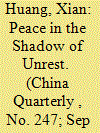

|
|
|
|
|
| Summary/Abstract |
Much research on contentious politics focuses on the origins and dynamics of contention or the impact of contention on policy change. Although some studies have delved into the state reactions to contention, relatively little is known about the outcome or effectiveness of state responses, especially in non-democratic settings. This paper attempts to fill this gap and to uncover the policy feedback effect in non-democratic settings by studying the Chinese state's repression of violent incidents targeted at healthcare personnel and facilities (yinao). I argue that without comprehensive healthcare reforms to tackle the root causes of yinao, state repression of yinao generates unintended adverse outcomes, causing the doctor–patient relationship to deteriorate. Using the difference-in-differences method with China Family Panel Studies data for 2014 and 2016, I find that the criminalization of yinao diminishes public trust in doctors and confidence in hospitals’ competence and instead increases public concerns about the healthcare system.
|
|
|
|
|
|
|
|
|
|
|
|
|
|
|
|
| 15 |
ID:
105891
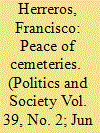

|
|
|
|
|
| Publication |
2011.
|
| Summary/Abstract |
This article analyzes whether state repression in post-civil war situations can be explained by dynamics associated with previous civil wars. It claims that in post-civil war situations the state can more easily resort to indiscriminate repression against social groups, relying on information related to the civil war. Two civil war dynamics are tested: preemptive indiscriminate violence to eliminate opposition by the defeated population and retaliation for crimes committed during the war. Using data from the first decade of the Francoist regime in Spain, the author found that civil war dynamics, and not actual dissent, explain most of the country's postwar violence.
|
|
|
|
|
|
|
|
|
|
|
|
|
|
|
|
| 16 |
ID:
140176
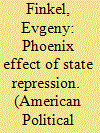

|
|
|
|
|
| Summary/Abstract |
Why are some nascent groups able to organize sustained violent resistance to state repression, whereas others quickly fail? This article links the sustainability of armed resistance to a largely understudied variable—the skills to mount such a resistance. It also argues that the nature of repression experienced by a community creates and shapes these crucial skills. More specifically, the article focuses on a distinction between selective and indiscriminate state repression. Selective repression is more likely to create skilled resisters; indiscriminate repression substantially less so. Thus, large-scale repression that begins at time t has a higher chance of being met with sustained organized resistance at t +1 if among the targeted population there are people who were subject to selective repression at t‒1. The article tests this argument by comparing the trajectories of anti-Nazi Jewish resistance groups in three ghettos during the Holocaust: Minsk, Kraków, and Białystok.
|
|
|
|
|
|
|
|
|
|
|
|
|
|
|
|
| 17 |
ID:
152864
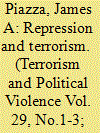

|
|
|
|
|
| Summary/Abstract |
While some scholars have theorized that repression reduces terrorism because it raises the costs of participating in terrorist activity by dissidents, others argue that repression stimulates terrorism by either closing off nonviolent avenues for expressing dissent or by provoking or sharpening grievances within a population. This study investigates these contradictory sets of expectations by considering whether or not different specific types of repression yield different effects on patterns of terrorism in 149 countries for the period 1981 to 2006. By assessing the impact of nine specific types of repression on domestic terrorism, the study produces some interesting findings: while, as expected, forms of repression that close off nonviolent avenues of dissent and boost group grievances increase the amount of domestic terrorism a country faces, types of repression that raise the costs of terrorist activity have no discernible suppressing effect on terrorism.
|
|
|
|
|
|
|
|
|
|
|
|
|
|
|
|
| 18 |
ID:
114676
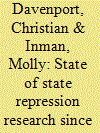

|
|
|
|
|
| Publication |
2012.
|
| Summary/Abstract |
Researchers have been exploring government repressive behavior for decades, but the greatest improvements have come in the last two. For example, greater theoretical specification has allowed us to determine a great deal about what repression is and why it occurs, while greater methodological sophistication has allowed us to test these theories rigorously. Despite or rather because of these advancements, however, we know comparatively little about what impact repression has on other social, economic, and political phenomena. This article reviews our general knowledge of the topic and attempts to improve our understanding of how repressive action influences behavioral challenges to governments.
|
|
|
|
|
|
|
|
|
|
|
|
|
|
|
|
| 19 |
ID:
187550
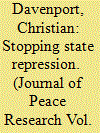

|
|
|
|
|
| Summary/Abstract |
While research into why repression/human rights violation goes up or down has thrived over the past 50 years, essentially no effort has been made to examine what stops this behavior once under way – especially activity that is large-scale as well as violent. To address this topic, we put forward the idea of a repressive spell (similar to that in the study of war, civil war, and terrorism) and a new theoretical framework that conceptualizes repression as a sticky process that is unlikely to terminate unless it is disturbed in some manner. Such an orientation is important because it leads us to conclude that disturbance is more likely to happen under situations of democratization compared to any of the factors typically highlighted in the literature and relevant policy community. Investigating a new database regarding 239 large-scale repression spells from 1976 to 2006, we find that democratization is associated with spell-termination and there is little systematic pacifying influence from anything else. Additionally, we find that nonviolent movements for change principally drive democratization but that these movements have little direct impact on state repression spells in and of themselves.
|
|
|
|
|
|
|
|
|
|
|
|
|
|
|
|
| 20 |
ID:
190025
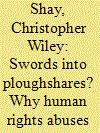

|
|
|
|
|
| Summary/Abstract |
Human rights abuse tends to increase during national crises, such as civil wars and mass nonviolent uprisings. Under what conditions does this abuse abate or persist? I argue that violent challenges provoke much more coercive state responses, exposing more personnel within the security forces to extreme forms of repression and priming them (both leaders and followers) to reproduce these behaviors after the conflict has terminated. This effect is mitigated or avoided when challengers rely on nonviolent tactics instead of violence, leading to less post-conflict abuse. I test this argument with several quantitative methods, which establish a positive association between nonviolent resistance campaigns and subsequent freedom from political killings. Results also suggest that democratization can partially – but not fully – counteract the repressive legacies of violent conflict. By choosing to specialize in nonviolent tactics, therefore, resistance leaders avoid a repression trap that not even democratization can fully disarm.
|
|
|
|
|
|
|
|
|
|
|
|
|
|
|
|
|
|
|
|
|